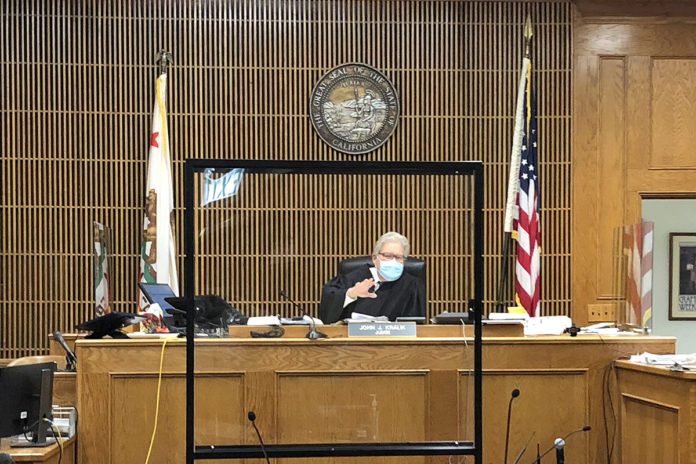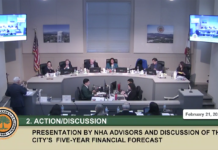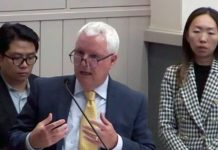
Superior Court Judge John J. Kralik, presiding over a costly and emotional legal battle between the City of South Pasadena and its own resident Alison Smith, dealt the city a blow Monday, denying its motion to strike Smith’s civil rights claim. But he also questioned the lack of specificity and detail in Smith’s Bane Act civil rights claim, even as he gave her attorney, Edward Torres of Pasadena, 20 days to amend it.
Ironically, it was the lack of specificity in Smith’s Bane Act claim that formed the basis of Kralik’s rejection of the city’s motion because, the judge said, it did not specify an action on the part of the city on which the city could justify its immunity.
The exasperated judge ordered the parties to seek a date with the court’s settlement office, warning if that doesn’t work, he “may order a mandatory settlement conference” in his own courtroom. He strongly admonished both sides to “withdraw from pleading wars.” Not doing so, he wrote in his ruling, would “threaten to create an unending tornado of self-referential claims obscuring the original issue.”
It was unclear if Kralik was aware the parties already had a day-long mediation conference before retired Judge Suzanne Bruguera of ADR Services.
But despite the judge’s admonishment, neither side sounds ready to settle. “Too much has happened and too much wrong has been done,” Smith told the South Pasadenan News. “The truth will be exposed so until there is resolution, I will keep fighting.”
“In denying the City’s anti-SLAPP motion, and deciding that the City’s right to seek a code enforcement inspection warrant is not ‘protected activity’ under the SLAPP statute, the judge has ignored the express text of the SLAPP statute and the applicable case law,” said City Manager Sean Joyce. “The City believes that this is reversible error and is evaluating the timing and filing of an appeal.”
A special closed meeting of the City Council was scheduled for Wednesday evening to discuss the Smith case.
The aging dispute is over who’s to blame for the January 11, 2018 sewage spill in Smith’s backyard. After months of negotiations, no settlement emerged. Meantime Smith learned more about the potential long-term medical costs and effects on her three children due to having had her yard saturated with sewage for 30 hours, and became wary of the city’s refusal to release soil samples it had taken in May 2018, work that would cost her at least $15,000 to replicate.
In August 2019, she took her grievance to an open session of the City Council.
Less than two months later, she became the subject of a warrant for a code enforcement inspection of her home, carried out by five inspectors escorted by two police officers. Smith alleges this was an act of retaliation aimed at intimidating her and resulted in her family being “forcibly detained” during the inspection. She also argues that the city obtained the warrant fraudulently because the city’s application contained pictures of alleged major improvements to her home that were actually photos of her neighbor’s house. Aggrieved, she added the civil rights action to her complaint, raising the stakes for both parties.
But Joyce said to The South Pasadenan News, “It is Ms. Smith who has wrongfully retaliated against the City for obtaining the code enforcement inspection warrant.” He said she “does not have any rights to make numerous and substantial improvements to her home without permits or inspection by the City. The City absolutely has the right to enforce its zoning and building codes and there is no question that Ms. Smith is in serious violation of these laws.”
Rather than working cooperatively with the city to correct the violations, he added, “she filed her Bane Act claim, seeking $2.5 million in damages.”
The City maintains the inspection was predicated on an anonymous tip it received after the City Council hearing, and that the police were brought along because Smith refused a voluntary inspection. Smith notes the city has never provided any details about where the complaint came from and says her attorney simply asked that the inspection be postponed pending the litigation.
Judge Kralik wasn’t shy in expressing concerns with both parties’ legal tactics. He was “disturbed” the city went before Judge Jared Moses to get the warrant without apprising Moses about the litigation. The city’s attorney, Jennifer Pancake, told the judge the inspection was a “separate, parallel administrative proceeding,” a notion Smith said is belied by the listing of the 21 alleged permit violations discovered during the inspection in the counterclaim the city filed in the litigation.
The Judge also said he was “deeply troubled” the City responded to Smith’s Bane Act claim by using an anti-SLAPP motion — a legal action designed to protect individuals and public interest groups from harassment suits filed by large corporations.
He noted the City did not claim the Bane Act complaint was interfering with the City’s free speech, and as such anti-SLAPP was not an issue. The anti-SLAPP statute “does not create rights,” Kralik said. “It defends rights. I think some of the Courts of Appeal have lost sight of that.”
Pancake, who interrupted or talked over the judge six times during the hearing, argued the “gravamen of the Plaintiff’s complaint is that the city went to court and obtained an inspection warrant to conduct a code enforcement inspection.” She said that is a written or oral statement “that is expressly noted as being protected activity for purposes of the SLAPP statute.”
Kralik didn’t buy it. “To the extent that the SLAPP statue is being tortured to allow motions such as this one, it is itself an unconstitutional restraint on the 1st Amendment rights of the citizen in question, i.e., Mrs. Smith.”
But Kralik also derided Smith’s Bane Act claim as “not a good pleading.” He said he “get(s) the feeling that something wrong occurred here, and the City is not really defending it very much.” But he suggested Pancake was right in suggesting the Bane Act is the wrong remedy, as it does give the city some immunity. “Clearly your Bane Act complaint is not sufficient,” he told Torres.
Torres promised to include a lot more facts in the new filing.
“Give careful consideration to what you are doing and whether this is really appropriate,” the judge warned.
Smith told the South Pasadenan News that when she learned the city’s motion had been denied, it “made me want to fall to my knees in exasperated relief and yet dance in celebration at the same time.” She said her team will take the opportunity to add more details and evidence to her claim.
Note to readers: Article was updated 11:00pm 2/2/2021 to include comments from the City of South Pasadena back to The South Pasadenan News after business hours.
















.png)







